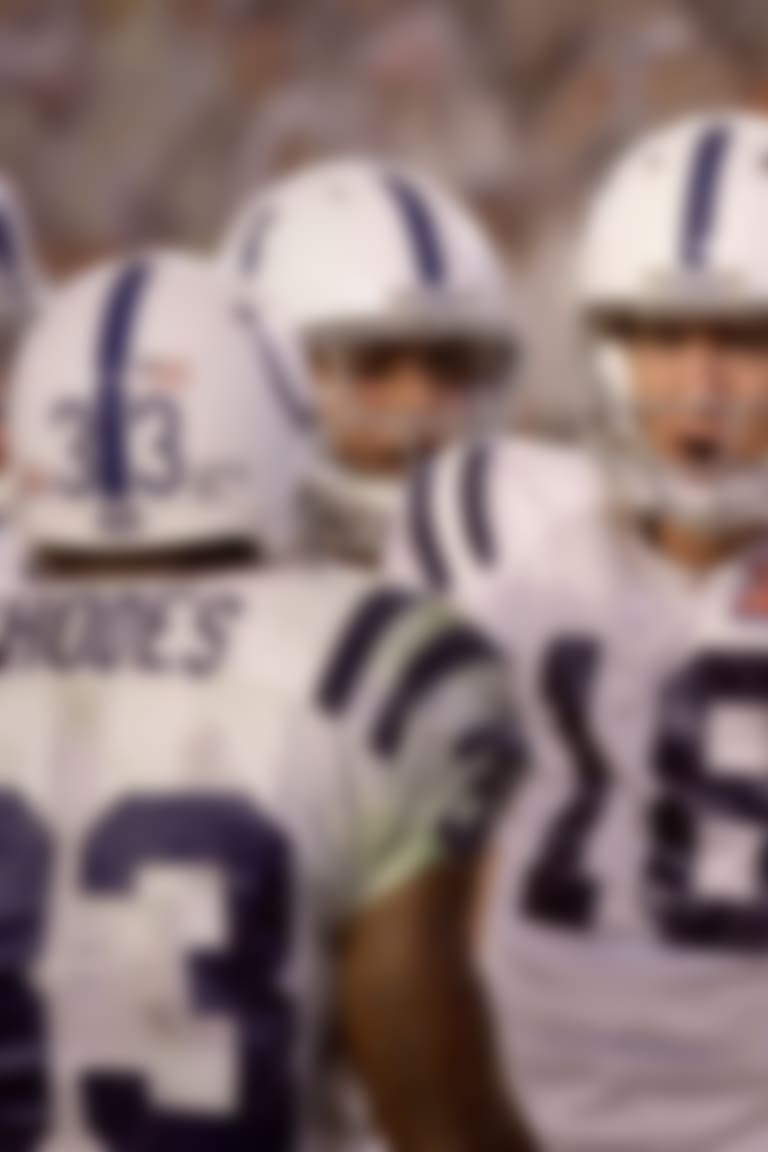By Judy Battista | March 6, 2016
Illustration by Albert Lee, Dennis Padua
When Peyton Manning was first grappling with the neck injury that would send his career on a stunning detour, he had a secret throwing session with his former college teammate, Todd Helton. Helton was playing for Major League Baseball's Colorado Rockies and, in a bit of irony that would become apparent only much later, he offered the team's training facilities in Denver for Manning to use during the NFL's 2011 lockout.
Those passes, thrown at the Rockies' indoor batting cages -- the better to be out of sight, the way Manning wanted it -- nosedived so dramatically that Helton thought Manning was playing a joke. He was not, Manning told him. The injury had sapped his arm strength, withered his triceps, sent his football future into very real doubt. The spinal fusion surgery would follow just a few months later and, not long after that, Manning's excruciating divorce from the Indianapolis Colts.
Manning was already in his mid-30s by then, a respectable retirement age for anybody who had endured brutal NFL Sundays, and certainly for one of the greatest quarterbacks in history. Even Manning and those closest to him were not sure then if he would ever be able to play again, if the strength and sensation in his prized right arm would regenerate enough to return to him the touch and accuracy that fashioned so many masterpiece games, that made him one of the most dominant players in all of football.
There had always been a storybook quality, not always happy but unfailingly compelling, to Manning's career. We have watched Manning -- born to football royalty, growing up as the heir apparent -- since he was a high schooler in New Orleans. The soaring successes of one breathtaking game after another, the dramatic failures in the playoffs, the first championship, the debilitating injury, the recovery, the magnificent 2013 season (when Manning gave football one last glimpse of his dominance), the late-career yearning for a second title, the physical breakdowns that shadowed him near the end.
And then, in his final season, maybe the most stirring and captivating turn in all those years. The change of coach, the forced pay cut, the adjustment to a new, unfamiliar offense that did not center around him, the injury that sent him to the bench, the thought that the last of his passes had already been witnessed without anyone even realizing it, the stunning return to the lineup. The stretch run, when Manning -- who had carried so many teams, with so many players, for nearly two decades -- was carried across the finish line by a smothering defense.
Just before Super Bowl 50 kicked off, Broncos linebacker Von Miller, who would be the game's Most Valuable Player, told Manning he was glad he was his quarterback. Manning, though, might have been even happier that Miller was his pass rusher.
Four years after his return from the injury, the day that Manning and his inner circle feared might have come more immediately, accompanied by that faint scar on the back of his neck, has arrived -- an exit from the NFL forced upon Manning by an accumulation of physical maladies, by a waning of his effectiveness, by a team already in the throes of moving on and away from him but triumphant nonetheless. With another Lombardi Trophy in his grasp, Manning has a departure befitting the extraordinariness of his career and his long-lasting impact on the game, sprinkled with confetti, riding off in a parade cheered by millions. It is fitting that his final pass was for a score -- a two-point conversion in the Super Bowl.
After 18 professional seasons, after four Super Bowl appearances with four different coaches, Manning finally announced what had seemed inevitable for months and what seemed certain by the time he held his 4-year-old twins in his arms on the Levi's Stadium field -- that he would retire with the rarest gift sports gives even its greatest superstars.
A championship.
Manning was the center of attention, including the kind he surely did not want, until the very end. His final weeks in the NFL were shadowed by an Al Jazeera America report that HGH had been sent to Manning's wife. Manning has strongly denied the suggestion that he might have taken a performance enhancing drug -- he called the story "garbage" -- but the NFL said it was investigating. Then, days after his final game, a 20-year-old incident from the University of Tennessee -- in which Manning was accused by a former athletic trainer of sexually assaulting her -- resurfaced as part of a sweeping lawsuit recently filed that alleges the school's athletic department has condoned a "hostile sexual environment" stretching back to the mid-1990s. At the time of the alleged incident, Manning denied the sexual assault allegation and described the event as mooning a teammate. The incident was settled by the university, although the athletic trainer later sued Manning when he described her, in a book, as having a "vulgar mouth." That suit was settled. Manning has not commented on the lawsuit against the University of Tennessee.
As for his on-field legacy, Manning retires with a record 200 victories -- the last one, the one that gave him the record for quarterbacks, came in the Super Bowl. He spent his prime years in Indianapolis and his final four seasons in Denver, but he won championships for both teams, one as the unquestioned fulcrum of the franchise, the other as a complementary, if still compelling, part.
Until his neck injury cost him the entire 2011 season, Manning had missed just one snap because of injury -- a broken jaw -- in his career. But the triumphant departure crafted by the Broncos -- and meticulously constructed by John Elway and Gary Kubiak -- could not obscure the obvious: that Manning's body could no longer withstand the beating the game imposes. And that even his brilliance at manipulating defenses at the line of scrimmage could not make up for the physical vulnerabilities that were apparent to everyone. Manning himself acknowledged it at the Super Bowl: that he might not have been what he once was, but that he could still move the chains, a diminution in responsibility that was in stark contrast to the reliance on him his teams had always had.
His final season began forgettably, and only through a too-unexpected-to-script series of turns did it ultimately become memorable. Manning threw seven touchdown passes and 10 interceptions in the first six games. That was surely, in part, because Denver was transitioning to a new offense under Kubiak -- his hiring last offseason and his desire to implement an offense at odds with Manning's skill set was a clear sign that the Broncos already were preparing for life without Manning -- and Manning would later say that his notable early inaccuracy was the product of his indecision. But others thought they detected a significant decrease in arm strength that, because of Manning's own uncertainty about what he was seeing, could no longer be concealed by Manning's formidable mental mastery of the game.

Manning's brain had always been his greatest weapon, and it is what will define his impact on the game. He changed the way quarterback was played, taking complete command of the offense from the shotgun position, changing plays, directing traffic, dissecting defenses -- an approach that others like Tom Brady and Aaron Rodgers later adapted and perfected. It was the diligence of his preparation, and Manning's love for that grind, that even his peers cited as influential.
Adversaries like Houston Texans linebacker Brian Cushing said that, at the height of Manning's career, opponents could tell just from looking at Manning when he had deciphered what an opposing defense was trying to do -- and they knew he would slice through them from then on. Quarterbacking brethren like Hall of Famer Dan Marino said no signal caller had ever maintained as much control over the game as Manning had.
But Manning had, in fact, anticipated that struggles would accompany the change to Kubiak's offense, and they were exacerbated by a makeshift offensive line that was beset by injury and inexperience. The Broncos remained unbeaten through the first six weeks of the 2015 season in spite of Manning, not because of him -- an unfathomable turn of events for a player who had been a dominant force practically since the moment he entered the league as the first overall pick in 1998 from Tennessee.
Those first games this past fall, combined with the $4 million pay cut Manning was forced to take before the 2015 season began, fueled the belief -- never confirmed -- that the campaign was Manning's unannounced retirement tour. When he threw four interceptions in rapid succession in a Week 10 game against the Kansas City Chiefs, and a partial tear of the plantar fascia in his left foot was revealed, Manning was replaced by Brock Osweiler in a painful and sudden changing of the guard. After the game, even Manning admitted that he had hurt his team by playing.


















